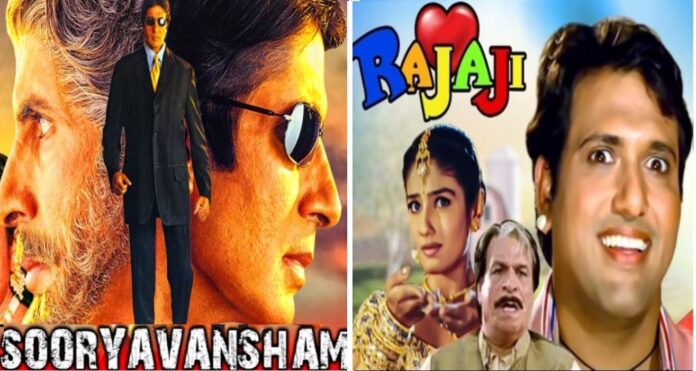SOORYAVANSHAM
Padmalaya Combines’ Sooryavansham is an unusual story about the relationship between a strict and rich father and his simpleton son whom he considers good for nothing. The son, however, loves his father and worships him. Now treated as a servant by everybody, he has a childhood girlfriend who studies in the city and whom he loves. But the girl spurns him because he is uneducated. Rather than let the girl win the wrath of his father, the son poses as if it is he who is not ready for the marriage. This infuriates the father even more. The girl, on her part, conveniently forgets the sacrifice the son has made for her. Enters another city-bred girl who falls in love with the simpleton. Although he considers himself much below her educated status, she coaxes him into agreeing to marry her. But his father orders him not to get married to the girl as he has assured the girl’s mother that the marriage would never take place. Rather than obey his father, the son revolts for the first time, and gets married to the girl. All hell breaks loose and the father throws the newly-weds out of his house after insulting them. The two start life from scratch but, by dint of hard work, earn name, fame and money. The wife becomes a Collector (after completing her IAS) and the husband, a business tycoon. Both of them, however, revere the father. A son born to them makes the grandfather soften his tough stand, by his cuteness and intelligence. Ultimately, the estranged father and son unite after years of separation.
Remake of the Tamil blockbuster of the same name, the film abounds in emotional scenes between father and son, some of which draw tears from the eyes. The unusual plot (story by Vikraman) unfolds on the screen, keeping audience interest alive, although the pace is slow at times. Comedy, at regular intervals, breaks the monotony of a tension-ridden drama. The first half is really wonderful. After interval, the screenplay takes recourse to clichéd situations at a few places. Aadesh K. Arjun’s dialogues are extraordinary and greatly enhance the impact of the drama. The build-up of the drama deserves special mention. Also deserving special mention are some scenes like the face-to-face meeting between the father-in-law and daughter-in-law (tear-jerker), the speech made by the son about his strict father, at the opening ceremony of the hospital (very emotional), the scene in which the father throws his son and daughter-in-law out of his house (truly dramatic), and the entire climax.
On the negative side is the double role of Amitabh Bachchan. In the role of the son, he looks too elderly. Several of the other important characters in the film are, curiously enough, South Indian film artistes, thereby giving the film a South Indian flavour. Music lacks a hit number — and that is a big minus point. Further, the title, too, has a South colour.
Although Amitabh looks too old for the son’s role, his performance is simply mesmerising. Both, as the father and the son, Bachchan acts with a rare maturity and delivers performances that are undoubtedly worthy of awards. His brilliant acting in the film will be discussed for a long time to come. His get-up and costumes in the father’s role are splendid. In summary, Amitabh Bachchan is just too good to be true. Soundarya may lack glamour and oomph but she, too, does a remarkable job. Not once do Amitabh and Soundarya go overboard. Jaya Sudha, too, is restrained as the wife of the older Bachchan. The voice of both the heroines have been excellently dubbed by Rekha. Anupam Kher is lovable as Amitabh’s confidant. He is superb in light scenes. Kader Khan is also terrific. Shivaji Satam is natural to the core. Bindu does an able job. Mukesh Rishi performs well. Rachna Banerjee, as Amitabh’s first girlfriend, is okay. Master Anand Vardhan is cool and confident.
E.V.V. Satyanarayana’s direction is fantastic but it must be said here that the treatment would be appreciated more by the class audience. Nevertheless, the director has added a lot of gloss and has treated the subject with freshness. Music should have been far better. ‘Dil mere’ is the best song but its repetition in the first half is a bit jarring. Song picturisations match the film’s mood. Action scenes are okay. Camerawork (Gopal Reddy) is breathtaking. Production values are very good. Technically, of a high order.
On the whole, Sooryavansham may have taken a slow start but it definitely has the merits (emotions, novelty, dialogues and extraordinary performances) to pick up by word of mouth and, thereafter, prove profitable.
Released on 21-5-’99 at Liberty and 19 other cinemas of Bombay thru Ethnic Enterprises. Publicity: below the mark. Opening: average. …….Also released all over except in East Punjab. Opening was dull at most of the places.
RAJAJI
Shivam Chitrya (Bombay)’s Rajaji is the story of a youth from a village, who shirks work and is so lazy that he decides to con the daughter of some rich business tycoon into marrying him. He succeeds in doing so but realises on the day of his marriage that the girl is not the daughter of a business tycoon but rather of the tycoon’s gardener! The young man’s frustration at being ‘conned’ gets the better of him and he confesses his evil designs but, in the same breath, blames his wife and father-in-law for having ‘fooled’ him into marriage. He also walks out on his wife, only to repent later. But while he is away, his father-in-law has become a multi-millionaire by winning a lottery. So, when he returns to make amends for his mistake, his pleas to win back his wife are interpreted as manifestation of his greed and designs to usurp the father-in-law’s wealth. He then decides to himself work hard and earn a lot of money. His wife has a change of heart and ultimately the two of them unite.
The first half has some entertaining moments, a couple of which are even hilarious. But the screenplay goes haywire after interval. The scene in which the hero gets drunk and confesses his designs (to hook a rich girl) is not just poor but also gramatically wrong. For one, he tries to justify his act by saying that many youngsters do similar things. How a wrong action can be sought to be made to look correct simply because a lot of people do the same wrong is not explained. Secondly, the hero blaming his wife for dressing up like a rich girl although she is poor (which, according to him, led him to think that she is rich), is simply ridiculous. Thirdly. the hero’s childhood friend, who exposes him at the start of the scene, has himself hooked a rich businessman’s ugly daughter; therefore, the friend’s outburst looks fake. The writer has tried to justify the scenes by making the hero talk out his frustration under the influence of liquor but that hardly justifies it. This whole scene is very important in the film, but, unfortunately, it drops the character of the hero so low that it becomes one which is almost beyond redemption. This is the film’s weakest point. Even otherwise, the second half takes recourse to clichéd situations. Climax is poor. Dialogues (Kader Khan) are fair.
Govinda does pretty well as usual, but he should guard against getting repetitive now. Raveena Tandon is fairly good. Satish Kaushik entertains at places. But Govinda and Satish Kaushik’s comedy is also too loud at places. Aroona Irani does an able job. Kader Khan is good. Shakti Kapoor has precious little scope. Mohan Joshi is average. Divya Dutta passes muster. Ranjeet fills the bill and so does Shagufta Ali. Dinesh Hingoo lends able support. Mushtaq Khan, Razzak Khan and Bobby Saini are so-so.
Director Vimal Kumar has not been able to continue the mirth of the first half, in the second half. The script (Satish Jain), covering the real drama, is quite shoddy and the director has not been able to salvage the film when the drama goes out of hand. Music (Anand Milind) is quite good. ‘Sunday ki raat thi’, ‘Tere pyar ne’, ‘Baj gaya tabla’ and ‘Saasuji tharo lalla’ are quite well-tuned. Picturisation of ‘Tere pyar ne’ is eye-filling. Camerawork is alright. Action scenes are okay. Production values are fair. Technically, okay.
On the whole, Rajaji suffers on account of a weak script and faulty characterisation of the hero. It cannot hope to fetch returns for its distributors. However, it may do somewhat better in Bombay and Maharashtra, where comedies are preferred.
Released on 21-5-’99 at Alankar and 21 other cinemas of Bombay thru ABC Pictures P. Ltd. Publicity: good. Opening: fair. …….Also released all over. Opening was below the mark at several places.
LATEST POSITION
The dull opening of SOORYAVANSHAM may not have shocked the trade, but it has definitely shaken the industry confidence.
…………
Hogi Pyar Ki Jeet is doing very well except in Bombay city and Delhi city. It is extraordinary in Bihar where it is expected to do a business of over 1 crore. It is also very strong in U.P., Gujarat, C.P.C.I. Rajasthan and Nizam. 2nd week Bombay 19,01,333 (51%) from 9 cinemas (10 on F.H.); Ahmedabad 7,15,151 from 4 cinemas, 1st week Padra 1,32,053, Valsad 2,55,236, 2nd week Vapi 2,16,910, total 6,71,006, Rajkot 1,75,053 from 2 cinemas (1 in matinee), Jamnagar 98,756; Kolhapur 1,43,494, Solapur 1,22,557; Delhi 12,82,674 from 6 cinemas (1 on F.H.); Kanpur 3,66,614 from 2 cinemas, Lucknow 2,71,124, Agra 2,26,212 (1st 2,86,710), Varanasi 2,04,417, Allahabad 80,962, Bareilly 1,24,083 (40.94%), Dehradun 1,10,000, Muzaffarnagar 82,000; Calcutta 10,90,765 from 13 cinemas; Nagpur 3,77,730 from 4 cinemas, Amravati 1,99,553, Akola 1,35,101, total 2,72,720, Raipur 2,07,012, Bhilai 1,56,058, total 3,32,062, Jalgaon 1,34,258; Jaipur 2,47,615, Bikaner 1,41,516; Hyderabad (gross) 6,07,767 from 3 cinemas (1 in noon, 1 on F.H.).
Kartoos 2nd week Bombay 22,09,980 (41.35%) from 12 cinemas (9 on F.H.); Ahmedabad 2,10,660 from 3 cinemas (1 unrecd.), Vapi 2,47,313, Rajkot 82,450 from 2 cinemas (1 in matinee), Jamnagar (matinee) 19,051; Kolhapur 1,32,171, Solapur 1,25,302 from 2 cinemas (1 in matinee); Delhi 13,84,099 from 9 cinemas (1 on F.H.); Kanpur 2,83,214 from 2 cinemas, Lucknow 2,80,345, Bareilly 65,920 (29.48%), Dehradun 1,01,003 (1st 2,18,000), Muzaffarnagar 60,000; Calcutta 3,94,389 from 4 cinemas; Nagpur 1,64,925 from 2 cinemas, Amravati (6 days) 75,714, Akola 89,025, total 2,86,416, Raipur (6 days) 51,186, Bhilai (6 days) 29,842, Jalgaon (6 days) 51,930, 1st week Chandrapur 1,76,304; 2nd week Indore 69,856, Bhopal (6 days) 1,27,852 from 2 cinemas; Jaipur 2,33,983, Jodhpur 1,75,000; Hyderabad (gross) 9,88,357 from 9 cinemas (2 in noon, 1 on F.H.); Vijayawada 2 weeks’ total (gross) 4,01,158.
Sarfarosh is class A1 in Bombay. It is also strong in C.P. Berar (Maharashtra belt), Rajasthan and Nizam in spite of World Cup cricket matches. 3rd week Bombay 42,49,186 (84.93%) from 12 cinemas (6 on F.H.); Ahmedabad 6,79,518 from 3 cinemas, Rajkot 1,04,176; Kolhapur 1,62,029, Solapur 1,65,128, 1st week Barsi 56,301; 3rd week Delhi 18,35,005 from 6 cinemas; Kanpur 2,70,775 from 2 cinemas, Lucknow 3,07,153, Agra 1,82,318, Varanasi 1,79,857, Bareilly 60,269 (21.24%), Dehradun 1,64,153 (2nd 1,80,000), total 6,09,701, Muzaffarnagar 50,000; Calcutta 9,42,543 from 5 cinemas; Nagpur 2,72,625 from 2 cinemas, Amravati 1,57,276, Akola 81,773, total 3,63,586, Raipur 70,518, Bhilai 75,632, 1st week Durg (6 days) 67,547, 3rd Jalgaon 95,225, 2nd week Wardha (6 days) 55,976; 3rd week Indore 1,86,160 from 2 cinemas; Jaipur 6,28,458, Bikaner 1,35,946; Hyderabad (gross) 11,89,345 from 5 cinemas; Vijayawada (gross) 2,53,009.
Dada Ne Wahalee Dikri (Gujarati, TF) is growing day by day. It is poised for a long and meritorious run in Gujarat and Saurashtra. 4th week Ahmedabad 3,97,854 from 3 cinemas, Baroda 57,675, Rajkot 1,15,000. 14 prints are running in Gujarat & Saurashtra.
LEGAL FRONT
NO RELIEF FOR PRITAM JALAN IN ‘SOORYAVANSHAM’ CASE
West Bengal distributor Pritam Jalan failed to get any relief from the court in the matter of distribution of Sooryavansham in West Bengal. Jalan had been appointed by Padmalaya Combines to exploit the film on its behalf in West Bengal territory. Thereafter, Padmalaya sold the film’s distribution rights to Vijay Khemka. In the meantime, Jalan had booked the film at some cinemas and he moved the court to restrain Padmalaya from granting the distribution rights to anybody other than himself.
The court, while rejecting Jalan’s plea, instructed Padmalaya to ensure that the commitments of Pritam Jalan to the cinemas in which the film was booked by him, were honoured.
‘DAAG THE FIRE’ 100 DAYS’ FUNCTION AT UDAY, AKOLA
Deepak Joshi and Narendra Joshi of Narendra Films, Amravati, the distributors of Daag The Fire for C.P. Berar, announced bonus for the staff of Uday Talkies, Akola, where the film completed 100 days on 21st May. The celebration function was held on 21st at the cinema. The entire Akola film trade was present at the function. From Amravati, Sharang Chandak, Lokendra Jain, Arjun Bhateja and Gopal Rathi attended.
Priya Rajurkar and Sangram Rajurkar, proprietors of Uday Talkies, and Arun Bopshetty, manager, welcomed the guests. The function was followed by a pooja and lunch.
The film is completing 100 days all over the country today (22nd May).
Tanwani’s Praiseworthy Gesture
It sounds unbelievable. But it is true. Producer Gordhan Tanwani has, of his own accord, converted his MG royalty agreements of Ishq with most of his distributors, into those for outright sale. This means, large-hearted Tanwani has, with one stroke of his pen (he has dashed off letters to his distributors, to break the good news), decided to forgo all overflow that may accrue to him in the months and years to come. The agreements with his distributors are valid till 28th November, 2002. The outright status, as per his letters, comes into effect from 1st April, 1999.
Something which could easily pass off as an April fool joke for the simple reason that no producer has the guts to show such largesse, has come as a happy reality for the distributors of Ishq. In his letter, Tanwani has thanked his distributors for having stood by him and for having exploited his film to the best of their ability. He has also acknowledged their having given him overflow as well as having increased their MG royalty after the film was pronounced a hit. It may be recalled that Gordhan Tanwani, in a rare gesture, had, at the time of release of his film, asked his distributors to increase their MG royalties only if it succeeded at the box-office. When it did, his distributors unhesitatingly paid the balance MG royalties. They appreciated his concern for his distributors, which made him ask for the enhanced MG royalty only in the event of the film hitting the bull’s eye. According to Tanwani, the enhanced MG price was arrived at to cover his cost of production which was phenomenal.
The producer’s concern for his distributors at the time of the film’s release has now given way to a rewarding gesture towards them. Tanwani has requested them not to henceforth send him any overflow and also to desist from sending him the business statements of the film, as the film was now theirs and only theirs, till 28th November, 2002. Why, Nizam distributor Ravi Machhar’s cheque for overflow for the month of April, sent to Tanwani before the letter reached Machhar, was forthwith returned by Tanwani’s office to Machhar, with thanks.
In these times of ever-growing greed of producers, the gesture of Gordhan Tanwani has come as a very pleasant surprise. A heroic act that deserves the highest praise.
Aditya Chopra Teams Amitabh, Shah Rukh In Yash Chopra’s ‘Mohabbatein’: Uday Chopra To Make Debut
Amitabh Bachchan and Shah Rukh Khan will come together for the first time in Yash Chopra’s Mohabbatein, to be written and directed by Aditya Chopra. Uday, younger son of Yash Chopra, will make his acting debut with this film in which he, too, will play a leading role. Two more young boys and three young heroines, besides the other cast, are being finalised. Jatin Lalit have been signed to score the music. Lyrics: Anand Bakshi. Cinematographer: Manmohan Singh. Art: Sharmishta Roy.
The film will be launched with song recordings in June.
PRODUCTION NEWS
‘Shool’ Complete
With the completion of the last 15-day shooting schedule last week, the entire shooting of Dream Merchants’ Shool is now complete. Starring Raveena Tandon, Manoj Bajpayee, Sayaji Shinde, Vallabh Vyas, Ganesh Yadav, baby Aavi, Virendra Saxena and others, the film is jointly produced by Nitin Manmohan and Ramgopal Varma and directed by E. Niwas. Music is scored by Shankar-Ehsaan-Loy. Lyrics: Sameer. Writer: Anurag Kashyap. Editing: Bhanodaya. Background music: Sandeep Chowta. Cinematography: Hari Nair.
‘Bichhoo’ Shot For 11 Days
Guddu Dhanoa’s Bichhoo, presented by Narinder Dhanoa, was shot in its second schedule from May 9 to 19 at Kamal Amrohi Studios, Gorai island and on various locales of Bombay. Bobby Deol participated along with Farida Jalal, Mohan Joshi and junior artistes. The film, being made under the banner of Bhagwan Chitra Mandir, co-stars Rani Mukerji and Raj Babbar. Music is by Anand Raaj Anand, and lyrics, by Sameer. Veena Sood is the executive producer.
3-E
Education-Entertainment-Enlightenment
Double-Role Voice
Is Amitabh Bachchan the only one playing a double role in Sooryavansham? No! Rekha, too, plays a dual role. Rekha?!? Well, it’s actually Rekha’s voice ‘playing’ a double role. For, the actress has dubbed for both the heroines of the film, viz. Soundarya and Jaya Sudha. On whose request did Rekha agree to dub for the two heroines? Your guess is as good as ours. But it must be added here that Rekha has done a fantastic job of the dubbing.
Incidentally, Sarath Kumar had played a double role (of father and son) in the Tamil original version, also titled Sooryavansham. Sarath Kumar was passing through the worst crisis of his career when Sooryavansham was released, having given 14 flops in a row, and Sooryavansham changed all that when it turned out to be one of the biggest hits of Tamil cinema! In the Telugu remake (again titled Sooryavansham), it was Venkatesh who was cast in the double roles of father and son. In fact, insiders say that Vikraman, who was to have directed the Hindi remake also (he had directed the Tamil and Telugu versions), backed out after shooting for a few days, because he was unhappy about Amitabh’s double role in the film.
Distributor’s Dilemma
There are problems when a film doesn’t do well and there are problems when it does very well — as Bombay distributor Balkrishna Shroff (Shringar Films) is realising. The concern’s Sarfarosh is presently doing so well in Bombay that Shringar is experiencing a lot of trouble finding suitable cinemas for its other big film, Biwi No. 1, which releases next week. At Cinemax, Goregaon, Bombay, the latter was booked from 28th May onwards, and its publicity was also put up in time at the cinema. However, the excellent run of Sarfarosh there posed a serious dilemma for the distributor and quite understandably so. After all, it makes no business sense to take off a film which is doing terrific business at a cinema and replace it with another. Fortunately for Shringar Films, it also controls the cinema and so was able to shift Biwi No. 1 to New Era, Malad. However, the case is quite different at other cinemas outside Shringar’s control. Whether they will succeed in solving their dilemma remains to be seen.
Hogi Pair Ki Jeet
Producer Anil Sharma must be one hell of a patient man, going by the number of changes that have been made in the star cast of his recently released Hogi Pyar Ki Jeet. When the film was launched, the two lead pairs were Ajay Devgan – Mamta Kulkarni and Ayub Khan – Ayesha Julka. However, that had to change when Mamta’s refusal to attend the shooting schedules led to her being replaced by Shipla Shetty in the film. The film had been shot in 8 reels with Ajay, Ayub and Ayesha in the meantime. But even this star cast had to change when Neha was added to the cast in Shilpa Shetty’s place, and the Ayub-Ayesha pair was replaced by Arshad Warsi and Mayuri Kango. Thus the final casting was arrived at. However, there cropped up one small problem. Renuka Shahane, who was then playing Ajay and Ayub’s bua (paternal aunt) in the film, suddenly decided that she looks too young to play Arshad’s bua! She was promptly replaced by Ketki Dave and only then, things fell into place.
‘Taal’: Music Of The Saal?
Now some news on the music front. Subhash Ghai’s Taal is easily one of the most awaited musical albums currently. If the three songs from the album, that Information has heard, are anything to go by, the film’s music score may well go on to be the ‘music of 1999’. The combination of A.R. Rahman’s masterful compositions, Anand Bakshi’s simple yet rich and meaningful lyrics, and Ghai’s musical genius are bound to create a magic that may last for a long time. In fact, it is a measure of the supreme confidence of Tips in the film’s music that it has decided to release a hitherto unheard of 15 lakh cassettes in the first lot itself! Well, it looks like record-breaking times are here — at least, musically speaking!





























